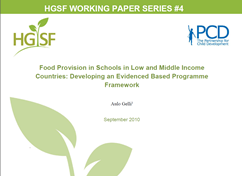 HGSF Working Paper Series #4 Food Provision in Schools in Low and Middle Income Countries: Developing an Evidenced Based Programme Framework
HGSF Working Paper Series #4 Food Provision in Schools in Low and Middle Income Countries: Developing an Evidenced Based Programme Framework
School feeding is a complex intervention and designing effective programmes requires a research evidence base that allows careful trade-offs to be explored among approaches, methods of feeding and costs.
The fourth paper in the HGSF Working Paper Series titled, Food Provision in Schools in Low and Middle Income Countries: Developing an Evidenced Based Programme Framework explores some of the trade-offs associated with the different methods of food service provision in schools, in terms of costs, benefits and the associated demand for food to develop an evidence based rationale for school feeding programmes.
Taking a standard programme evaluation approach, this paper reviews recent literature on the impacts and costs of school feeding to inform the development of the programme theory for school feeding.
The paper concludes that programme theory on the educational benefits of school feeding is generally well established and underpinned by an increasingly robust evidence base: School feeding programmes can help to get children into school and help to keep them there, through enhancing enrolment and reducing absenteeism; and once the children are in school, the programmes can contribute to their learning, through avoiding hunger and enhancing cognitive abilities. These effects may be potentiated by complementary actions, especially deworming and providing micronutrients.
In practice, school feeding programmes are complex interventions with many different possible configurations, involving a broad range of activities by different stakeholders at different levels. Policy makers and implementers can benefit from careful examination of the context, and trade-offs associated with the different design options of school feeding.
- Read more about the HGSF Working Paper Series





